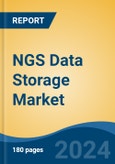Data Analysis Services is the fastest growing segment, North America is the largest regional market
Speak directly to the analyst to clarify any post sales queries you may have.
10% Free customizationThis report comes with 10% free customization, enabling you to add data that meets your specific business needs.
Key Market Drivers
The Global Next-Generation Sequencing NGS Data Storage Market is significantly shaped by the declining cost of next-generation sequencing, which has dramatically increased the accessibility and application of genomic technologies across various sectors. This reduction in cost makes large-scale sequencing projects more feasible, thereby intensifying the demand for robust data storage solutions. For instance, according to Illumina Inc., in April 2023, its NovaSeq X sequencing system was capable of generating over 20,000 whole genomes annually at a cost of $200 per genome, signaling a profound shift towards greater data generation at lower unit costs. This economic advantage directly fuels the expansion of sequencing activities in both research and clinical diagnostics, requiring substantial increases in data archival and retrieval infrastructure.Key Market Challenges
The Next-Generation Sequencing (NGS) data storage market faces a significant challenge in managing data overload and the inherent complexities of storage scalability. The exponential generation of genomic data presents substantial obstacles for organizations striving to effectively store, manage, and retrieve this information. This rapid growth necessitates continuous upgrades to infrastructure and specialized technical expertise, which can strain budgets and operational capabilities for various institutions.This persistent issue directly impedes the growth of the global NGS data storage market by increasing operational expenditures for research institutions and clinical facilities. The costs associated with acquiring, maintaining, and scaling storage solutions to accommodate ever-expanding datasets can divert capital that might otherwise be invested in new sequencing technologies or advanced analytical tools.
Key Market Trends
The widespread adoption of cloud and hybrid storage models represents a significant shift in how Next-Generation Sequencing data is managed, offering enhanced scalability and flexibility that on-premises solutions often cannot match. These models enable research institutions and healthcare providers to dynamically scale their storage infrastructure in response to ever-increasing data volumes without substantial upfront capital expenditure. This operational agility facilitates collaboration and provides robust data access for global research initiatives. According to SQ Magazine in July 2025, the healthcare sector experienced a 41% year-over-year increase in cloud adoption, highlighting this growing reliance. Genomics England, for example, utilizes cloud technology to underpin its digital infrastructure, enabling advanced DNA analysis for better disease prevention and personalized patient care, demonstrating the practical application of these models in handling tens of petabytes of sensitive genomic data.Key Market Players Profiled:
- Agilent Technologies, Inc.
- BGI Group
- DNAnexus, Inc.
- F. Hoffmann-La Roche Ltd.
- Illumina, Inc.
- Perkin Elmer, Inc.
- Pacific Biosciences of California, Inc.
- Qumulo, Inc.
- QIAGEN N.V.
- Thermo Fisher Scientific, Inc.
Report Scope:
In this report, the Global NGS Data Storage Market has been segmented into the following categories:By Offerings:
- Data Storage Solutions
- Data Analysis Services
- Other Offerings
By Data Storage Solutions:
- Cloud-based Data Storage Solutions
- On-Premises Data Storage Solutions
By Read Length:
- Long Read Length
- Short Read Length
By Sourcing Type:
- In-house NGS Data Storage
- Outsourced NGS Data Storage
By Application:
- Oncology
- Rare diseases
- Reproductive Health
- Infectious Diseases
- Central Nervous System
- Others
By End User:
- Academic and Research Institutions
- Pharmaceutical and Biotechnology Companies
- Molecular Diagnostic Laboratories
- Others
By Region:
- North America
- Europe
- Asia-Pacific
- South America
- Middle East & Africa
Competitive Landscape
Company Profiles: Detailed analysis of the major companies present in the Global NGS Data Storage Market.Available Customizations:
With the given market data, the publisher offers customizations according to a company's specific needs. The following customization options are available for the report.Company Information
- Detailed analysis and profiling of additional market players (up to five).
This product will be delivered within 1-3 business days.
Table of Contents
Companies Mentioned
The companies profiled in this NGS Data Storage market report include:- Agilent Technologies, Inc.
- BGI Group
- DNAnexus, Inc.
- F. Hoffmann-La Roche Ltd.
- Illumina, Inc.
- Perkin Elmer, Inc.
- Pacific Biosciences of California, Inc.
- Qumulo, Inc.
- QIAGEN N.V.
- Thermo Fisher Scientific, Inc.
Table Information
| Report Attribute | Details |
|---|---|
| No. of Pages | 180 |
| Published | November 2025 |
| Forecast Period | 2024 - 2030 |
| Estimated Market Value ( USD | $ 979.35 Million |
| Forecasted Market Value ( USD | $ 1750 Million |
| Compound Annual Growth Rate | 10.2% |
| Regions Covered | Global |
| No. of Companies Mentioned | 11 |









